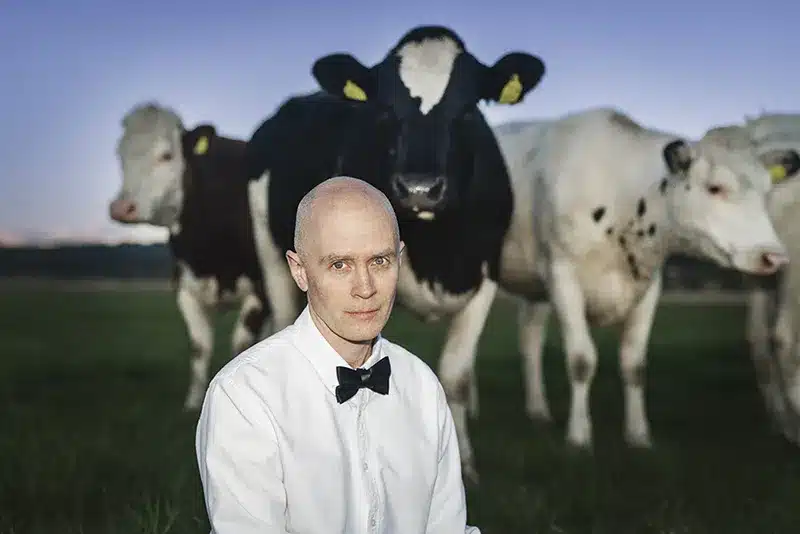
With his most ambitious LP to date, one that comes with an accompanying novel, Swedish songwriter Jens Lekman might have written his first musical.
 Songs For Other People’s Weddings Jens Lekman Secretly Canadian 12 September 2025
Songs For Other People’s Weddings Jens Lekman Secretly Canadian 12 September 2025
Despite having several songs attesting to his experience as a wedding singer to his name already, Jens Lekman doesn’t seem like the most natural choice for the gig. Sure, the man knows his way around a sampler (see 2007’s breakthrough Night Falls over Kortadela), and his catalogue includes many love songs capable of prompting dancefloor enthusiasm (see “How We Met, The Long Version” on 2017’s masterful Life Will See You Now). At the same time, several of his artistic hallmarks run against the typical grain of the wedding musician.
His often hyper-specific character observations could prove a mouthful to sozzled late-night crowds looking for an easy tune with which to chant along. The wry and dry streak in his humor often leads him to explore the bittersweet side of life, as when he likens himself to a hermit crab on “The Opposite of Hallelujah.” He’s a far gentler, if still gregarious, wedding singer than the type of guy at which Adam Sandler was aiming, closer to an ideal wedding guest than the guy at the microphone.

Yet Lekman, now several decades into a musical career marked by some fantastic albums, has in that time supported himself with a long series of wedding gigs – 132 as of this year, The Guardian reports. He put a would-be job ad on his first LP, 2004’s When I Said I Wanted to Be Your Dog, in the form of the number “If You Ever Need a Stranger (To Sing at Your Wedding”).
In the decades that followed, he amassed a series of requests to play at weddings that flung him across the globe. “Wedding in Finistère”, Life Will See You Now‘s best number and the closest thing Lekman’s written to a potential dance craze, documents a job he took on the Brittany coast, in which he humorously recounts an existential discussion with an anxious bride. The wisdom he passes on to her cribs from Kierkegaardian philosophy: “I said marry and regret it / Don’t marry, regret it too / Whether you marry or you don’t / Either way you’ll wish you hadn’t.”
Not precisely the decisiveness one might want to hear on their wedding day, but such musings haven’t seemed to put a damper on the jobs he’s booked. If that statement leaves one hanging, it nudged the bride in the right direction; shortly after that moment, Lekman sings, “We all danced and got drunk.”
Jens Lekman’s years of providing nuptial musical accompaniment have not simply been a source of side income. With his fifth studio record, Songs for Other People’s Weddings, he’s produced something boasting an ambition not just striking for him, but for any songwriter. A month prior to the LP’s release on 12 September by the Secretly Canadian label, Lekman’s friend, the novelist David Levithan, published a novel of the same name, intended as a companion to the music, which fleshed out the story behind the lyrics.
There are rock operas that are converted into musicals, and concept albums that are turned into films; however, albums that come with ready-made novels are a rarer breed. What’s more, the music on Songs for Other People’s Weddings represents some of the most grandiose arrangements of Lekman’s career: exultant strings, buoyant basslines, and show-stopping moments of introspection that feel like he’s commanding a follow spot on a Broadway stage.
In fact, though Songs for Other People’s Weddings isn’t a musical formally, it comes across as one spiritually. (Lekman admits to considering that idea in the aforementioned Guardian feature.) The album builds on the narrative of Levithan’s novel, which documents the ups and downs of a relationship between a musician named “J” and his girlfriend “V”, with tension stemming from J’s numerous sojourns to perform at weddings. (“J is not Jens,” Levithan assures the listener in a promo biography.)
Jens Lekman’s lyrics simultaneously follow the plot of the novel and fill it in with more detail, and more importantly, the color that can only come from music. Press materials for the record include an admission from Lekman that he was never drawn to musicals, but the music reveals an aptitude he hadn’t discovered until now. After all, the two parts of Songs for Other People’s Weddings are the book and the music.
The numerous sources of inspiration flowing through Lekman – along with his pre-existing musical influences, Levithan’s prose, and the life stories gleaned from years standing in front of brides and grooms the world over – push him to new heights compositionally, to places that evoke the stage. The show-stopping ten-minute number “Wedding in Leipzig”, in which J and V’s relationship reaches a breaking point, the jubilant tune that makes up the early half collapses into a somber moment of recognition by Lekman that’s “Defying Gravity” in reverse, an execution of emotional climax by restraint rather than maximalist indulgence.
When the sun-dappled melody of “Wedding in Leipzig” is later echoed in near-rubato as a wistful solo piano piece on the opening of “Just for One Moment”, one wonders if Lekman’s purported disinterest in musicals might be a bit – that’s the kind of move a Broadway pro always keeps in their back pocket. It wouldn’t be the first time he said something with tongue in cheek.
The formal boldness of Songs for Other People’s Weddings‘ concept proved a useful artistic fuel for Lekman. Call it an LP with an accompanying novel, a hybrid joint release, or a creative project gesturing to something bigger than the sum of its existing parts: the album flows naturally from where Life Will See You Now left off while broadening the horizon of his style.
The higher-pitched Lekman affects a Stephin Merritt-esque low end on the curtain-riser “The First Lovesong”, proves a capable duettist with Matilda Sargren (who gives voice to V) on several tracks, and sells some haunting fingerpicked acoustic balladry that evokes Carrie & Lowell on “GOT-JFK”. The broad canvas on which he paints, writing something meant to stand alone as a record and serve as the musical texture of a printed text, appears to have unlocked musical decisions that, while not radically deviating from the Lekman of the past, afforded him new colors to use.
Even when Songs for Other People’s Weddings bloats in its midsection – at one hour and 20 minutes, the whimsy might prove too much for those not inclined to Lekman and especially musicals – the narrative throughline and musical consistency, helped by a tasteful amount of melodic callbacks, keep things moving to the apex. That’s “Wedding in Leipzig”, after which the album comes to a powerful close with three songs that document the pages turning for J and V. However, if that book closes by the end of Songs for Other People’s Weddings, what Jens Lekman achieves here portends much richer volumes ahead.


